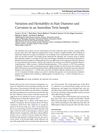 October 2022 in “Facial Plastic Surgery Clinics of North America”
October 2022 in “Facial Plastic Surgery Clinics of North America” Hair restoration surgery, including hairline-lowering and hair transplantation, can effectively treat hair loss and improve appearance in all ethnic groups.
 1 citations,
January 2016 in “Hair therapy & transplantation”
1 citations,
January 2016 in “Hair therapy & transplantation” OMICS International promotes scientific research and knowledge sharing by publishing peer-reviewed articles in various fields and organizing international scientific conferences.
 77 citations,
March 2001 in “Clinics in Dermatology”
77 citations,
March 2001 in “Clinics in Dermatology” Androgenetic alopecia involves genetics, hormones, and can be treated with medications or surgery.
 87 citations,
July 2009 in “The journal of investigative dermatology/Journal of investigative dermatology”
87 citations,
July 2009 in “The journal of investigative dermatology/Journal of investigative dermatology” Human beard hair medulla contains a unique and complex mix of keratins not found in other human tissues.
 59 citations,
June 2008 in “Journal of The American Academy of Dermatology”
59 citations,
June 2008 in “Journal of The American Academy of Dermatology” The article explains the genetic causes and symptoms of various hair disorders and highlights the need for more research to find treatments.
 41 citations,
June 2006 in “Journal of Investigative Dermatology”
41 citations,
June 2006 in “Journal of Investigative Dermatology” Beard and scalp hair cells have different gene expressions, which may affect beard growth characteristics.
 38 citations,
August 2012 in “Biochemical and biophysical research communications”
38 citations,
August 2012 in “Biochemical and biophysical research communications” Human leukocytes and beard hair follicle cells have internal daily clocks, and PER1 and PER3 genes may indicate individual circadian rhythms.
 9 citations,
January 2015 in “Current problems in dermatology”
9 citations,
January 2015 in “Current problems in dermatology” Scientists have found specific genes linked to different hair loss conditions, which could lead to new treatments.
 1 citations,
February 2013 in “InTech eBooks”
1 citations,
February 2013 in “InTech eBooks” Genetic mutations cause various hair diseases, and whole genome sequencing may reveal more about these conditions.
 89 citations,
September 2010 in “Annual Review of Genomics and Human Genetics”
89 citations,
September 2010 in “Annual Review of Genomics and Human Genetics” The document concludes that understanding the genes and pathways involved in hair growth is crucial for developing treatments for hair diseases.
 87 citations,
March 2011 in “Australasian Journal of Dermatology”
87 citations,
March 2011 in “Australasian Journal of Dermatology” Genetics and hormones play a role in male and female hair loss, but more research is needed to fully understand it.
 1 citations,
July 2023 in “Journal of Clinical Medicine”
1 citations,
July 2023 in “Journal of Clinical Medicine” Different causes of beard hair loss have various treatments, including medications, lifestyle changes, and procedures to stimulate hair growth.
 29 citations,
September 2012 in “Dermatologic Clinics”
29 citations,
September 2012 in “Dermatologic Clinics” Hair disorders are caused by a complex mix of biology, genetics, hormones, and environmental factors, affecting hair growth and leading to conditions like alopecia.
22 citations,
September 2017 in “Skin appendage disorders” Ruxolitinib helped a man regrow his beard after years of hair loss.
 68 citations,
March 1965 in “The BMJ”
68 citations,
March 1965 in “The BMJ” Hormones and genetics affect hair growth and patterns, with some changes reversible and others not.
 59 citations,
August 1998 in “International Journal of Dermatology”
59 citations,
August 1998 in “International Journal of Dermatology” Genetics and hormones cause hair loss; finasteride treats it safely.
 22 citations,
May 1999 in “International Journal of Dermatology”
22 citations,
May 1999 in “International Journal of Dermatology” Hair loss from genetics and hormones can be treated with drugs or surgery.
 20 citations,
September 1978 in “International Journal of Dermatology”
20 citations,
September 1978 in “International Journal of Dermatology” Hair growth is influenced by factors like genetics and nutrition, and more research is needed to understand hair loss and growth mechanisms.
 1 citations,
March 2021 in “Dermatological reviews”
1 citations,
March 2021 in “Dermatological reviews” AGA, a common hair loss, is caused by genetics, hormones, age, and environmental factors.
 October 2023 in “IntechOpen eBooks”
October 2023 in “IntechOpen eBooks” Genes and epigenetic changes are important in the development of Polycystic Ovary Syndrome.
 153 citations,
March 2017 in “Endocrine”
153 citations,
March 2017 in “Endocrine” Male pattern baldness involves genetics, hormones, and needs better treatments.
 99 citations,
June 2005 in “Journal of Cosmetic Dermatology”
99 citations,
June 2005 in “Journal of Cosmetic Dermatology” Hair ages due to genetics and environmental factors, leading to graying and thinning, with treatments available for some conditions.
 5 citations,
June 2016 in “Twin research and human genetics”
5 citations,
June 2016 in “Twin research and human genetics” Hair diameter and curvature are mostly determined by genetics.
 1 citations,
November 2017 in “Expert opinion on orphan drugs”
1 citations,
November 2017 in “Expert opinion on orphan drugs” Scientists now better understand the genetics of hypohidrotic ectodermal dysplasia, leading to more accurate diagnoses and potential new treatments.
 May 2021 in “GSC Advanced Research and Reviews”
May 2021 in “GSC Advanced Research and Reviews” Hair color is influenced by genetics and can indicate certain health conditions.
 47 citations,
January 2013 in “International Journal of Cosmetic Science”
47 citations,
January 2013 in “International Journal of Cosmetic Science” Hair diversity is influenced by complex genetics and environmental factors, requiring more research for practical solutions.
 May 2024 in “Indian Journal of Dermatology”
May 2024 in “Indian Journal of Dermatology” Androgenetic alopecia in men is genetic and linked to health issues like obesity and heart disease, with treatments including minoxidil, finasteride, and hair transplants.

Skin changes throughout life, from development before birth to aging effects like wrinkles, influenced by both genetics and environment.
 40 citations,
December 2011 in “British Journal of Dermatology”
40 citations,
December 2011 in “British Journal of Dermatology” Women's hair generally gets thinner and less dense starting in their mid-thirties, with hair loss becoming more common as they age due to both genetics and environment.
 July 2021 in “World journal of plastic surgery”
July 2021 in “World journal of plastic surgery” Hair transplantation is effective for treating scar-related hair loss on the head and neck.





























